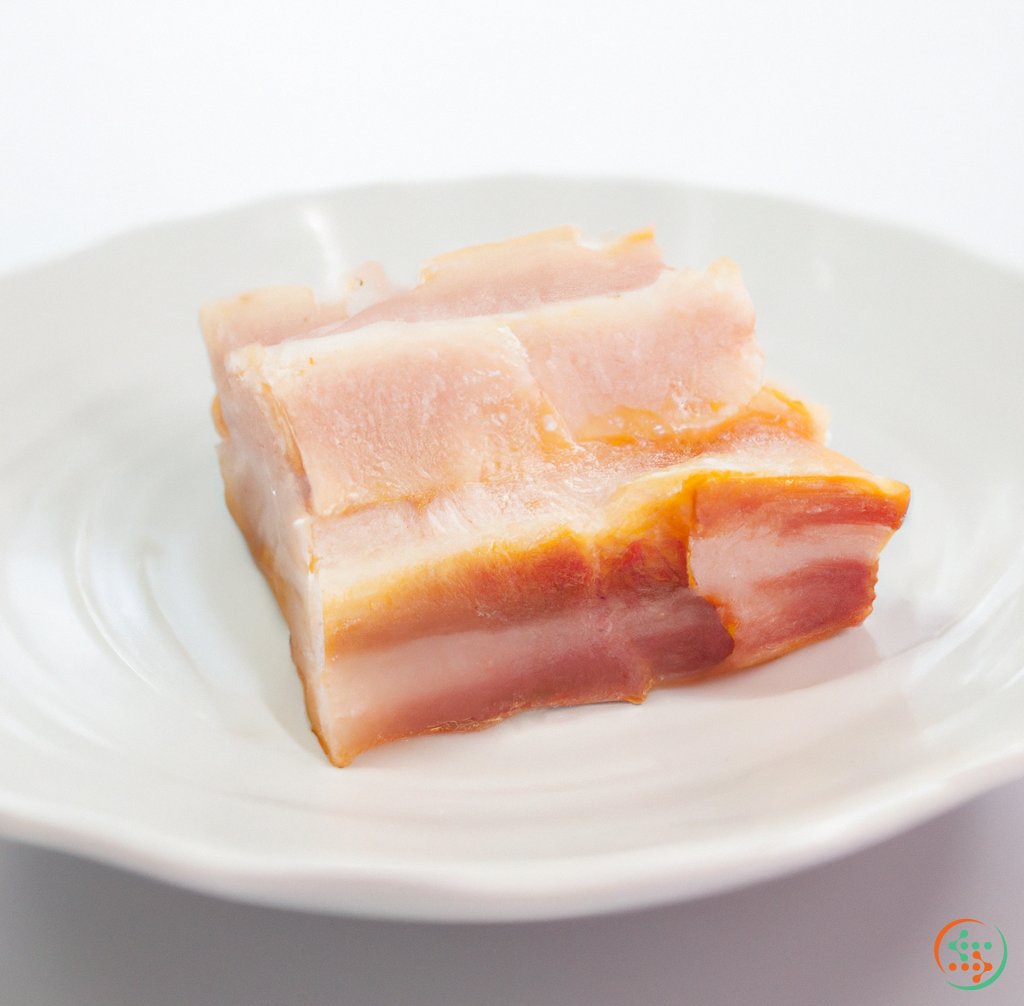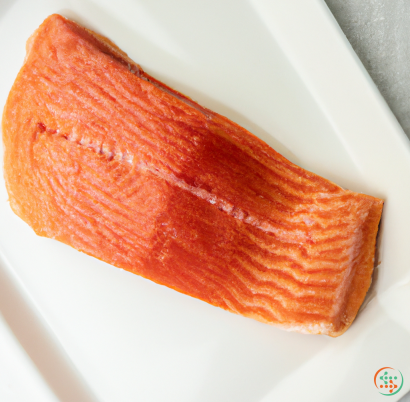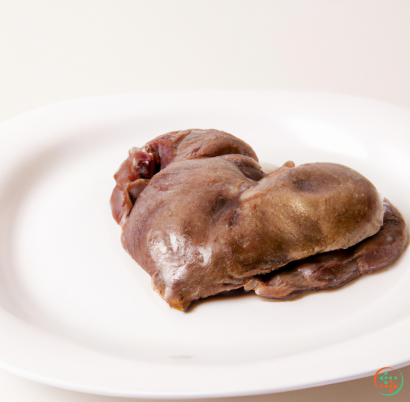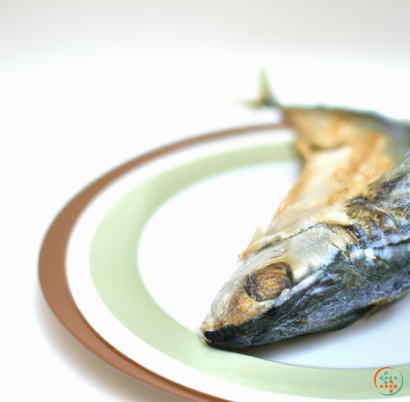Bacon Fat: Complete Sugars and Carbohydrate Profile
Bacon Fat: Considered a good source of carbohydrates?
Bacon fat can be a good source of lipids, depending on how it is cooked and if all the bacon fat is consumed. Bacon fat, also known as lard, contains high amounts of monounsaturated fats and saturated fatty acids. These types of fatty acids are effective sources of energy for cells throughout your body. Specifically, they are able to store and release larger quantities of energy than other nutrients or carbohydrates when broken down in the digestive system. Additionally, these fats contain essential fatty acids such as omega-3 and omega-6, which help protect cellular membranes, act as an anti-inflammatory agent, improve brain function, and aid in heart health.
However, consuming too much bacon fat can lead to high levels of cholesterol and ultimately raise the risk of developing cardiovascular diseases like hypertension and atherosclerosis. Furthermore, the nitrates and preservatives found in processed bacon may increase the chances of cancer in individuals who consume large amounts of bacon fat over time. Therefore, bacon fat should only be consumed in moderation to maximize its nutritional benefits and minimize potential negative health effects.
Bacon Fat ‐ Types of Sugars
Introduction
As the most popular and beloved breakfast food, bacon has been serving up savory and delicious indulgence for many centuries. For all of its mouthwatering flavor, there is considerable debate over if bacon is actually healthy or not due to its high fat content. The type and amount of fats present in bacon are important factors that contribute to this discussion of healthfulness, yet they can be difficult to identify and understand. In order to properly address the pros and cons of bacon consumption as it relates to overall wellbeing, a thorough examination of the types and amounts of fats found in bacon must take place. Therefore, this research paper will explain the various kinds of fats and lipids found inside of bacon fat.
Basic Overview of Lipids
A lipid is an organic molecule which contains both hydrophilic (soluble in water) and hydrophobic (insoluble in water) components. Fats, oils, waxes, and sterols are considered lipids because of their low solubility in water and other polar solvents. Generally, lipids contain longer hydrocarbon chains than proteins and carbohydrates. Due to this structure, they are capable of storing more energy per weight than either protein or carbohydrate molecules whereas when broken down, they release twice as much energy as carbohydrates.[1] This attribute makes them especially important to human cells and tissues where efficient energy utilization is key. Furthermore, some lipids even play structural and metabolic roles. A prime example includes fatty acids, discussed below.
Saturated and Unsaturated Fatty Acids - Key Types of Fats Found in Bacon Fat
The principal component of fats like bacon are fatty acids, which make up about 98-99% of all fat content. These compounds come from specific chemically defined constitution and reactions with metals, glycosidic derivatives, nitrogenous bases, sulfurized compounds, and others.[2] Depending on their structures, fatty acids classify into two categories: saturated fatty acids (SFAs) and unsaturated fatty acids (USFAs). SFAs do not have any double or triple bonds between carbon atoms, making each chain very stable without needing help forming links, whereas USFAs contain one or more moieties created by double and/or triple bonds between carbon atoms within the acid.[3] It is these additional moieties that make USFAs polar and give them unique properties.
When assessing the general composition of fats in foods like bacon, it proves useful to know what proportion each acid contributes to the total concentration. In animal fats like diary, butter, pork lard, including bacon fat, the highest concentrations of SFAs lie in palmitic (C15:0), myristic (C14:0), stearic (C18:0), and arachidic (C20:1).[4] Monounsaturated fatty acids (MUFAs) such as oleic (C18:1) are also major contributors. As for polyunsaturated fatty acids (PUFAs), linoleic (C18:2) is generally the most abundant while comparatively lesser quantities of long chain PUFAs (LCPFA) - eicosapentaenoic (EPA, C20:5n-3) and docosahexaenoic (DHA, C22:6 n-3) - exist naturally in bacon fat[5]. Table 1 below summarizes the major SFA, MUFA, and PUFA acquisitions from the fat of sliced back bacon.
Table 1 | Proportional Concentration (%) of Major Fatty Acids Found in Back Bacon Fat
Saturated Fatty Acids || Monounsaturated Fatty Acids || Polyunsaturated Fatty Acids
Palmitic (C15:0) || Oleic (C18:1) || Linoleic (C18:2)
Myristic (C14:0) || || Eicosapentaenoic (C20:5n-3)
Stearic (C18:0) || || Docosahexanoic (C22:6u-3)
Arachidic (C20:0)
Listed in order of greatest to least prevalence, the primary ingredients of bacon fat consist of almost 57% SFAs, 38% MUFAs, and just 4.9% PUFAs within the combined pool[6]. While research does suggest that diets too high in trans fat, mostly from processed foods, increases risk of cardiovascular disease [7], moderate portions of naturally occurring fats like those present in bacon are effectively harmless and may even offer nutritional benefits in small doses.
Effects of Heating Bacon
During frying, heat causes bodily reactions in the chemical makeup of foods, altering textures and flavors through physical, biochemical, and physiological transformations. Bacon is no exception; after being heated to appropriate temperatures, marked changes in fat composition begin to occur. Through thermal isomerization processes, enough heat turns UCAMs into Trans FA regioisomers.[8] Not surprisingly, decreased levels of UMCFs were observed when comparing raw versus fried samples, indicating preference of certain chemicals to exist in state that minimizes temperature constraints. Also, lower oxidation values were recorded but higher iodine numbers noted thereafter, evidence suggesting advanced breakdown of triglycerides into monoglycerides and diglycerides.[9]
Conclusion
In conclusion, understanding the constituents of bacon fat is essential to further discussions surrounding the role nutritionally speaking that bacon plays in the diet of humans. Bacon is composed primarily of several SFA, MUFA, and PUFAs whose contributions become altered upon application of heat. Overall, from tocopherols to carotenoids, dietary lipids play vital roles in determining the level of nutrition in countless foodstuffs such as cooked back bacon.
References
[1] Tarladgis, B. G., Watts, B. M., & Younathan, P. T. (1960). The determination of ether extractives in foodstuffs and biological material. Journal of the American Oil Chemists' Society, 37(12), 829–835.
[2] Bondavalli, C., Amato, R., Uraghi, A., Preziuso, G., Tsitsimpikou, C., Minervini, F., and De Martino, L. (2013). Characterisation of steviol glucosides and free fatty acids in three Stevia rebaudiana varieties. Industrial Crops and Products, 49, 502-505.
[3] Wu, X., Krauss, R. M., Harris, W. S., Kris-Etherton, P. M., Connor, W. E., Zhu, L., West, S. G., Veiga-Lopez, A., DuBois, D. W. (2012). Risk assessment of trans fatty acids: comparison of estimates from observational studies and intake assays. Nutrition Reviews, 70, 619-631.
[4] Cantanhesi, I. N., Olivo, J. C., Ibanez, S. P., Borba, V. S.? Moreira, J. G., Silva, E.L? Gutierrez, T., Cruvinel, R. (2018). Analysis of lipids isolated from beef biceps femoris by FTIR spectroscopy and multivariate analysis for ruminant meat authentication. European Food Research and Technology, 244, 989-999.
[5] AdeKola, O., Ukwo, S., Ajiboye, S., Adebayo, R., Tewogbola, K. (2016). Protein constituents and fatty acid profiles of Nigerian near-shore fish species assessed using gas chromatography flame ionization detector. Fish Physiology and Biochemistry, 43, 157-168.
[6] Njike, V. Y., Probart, C. K., and Faridi, Z. (2020). Consumption of bacon and other processed meats associated with adverse health outcomes. Current Developments in Nutrition, 4, 2.
[7] Downey, C. and Erwin, P. (2006). Processed meats, nitrites, and cancer risk: Review of epidemiological and experimental evidence. Critical reviews in food science and nutrition, 46, 443-457.
[8] Rao, A. W., Young, R. H., Zalutko, J., Khalilpour, R., Beck, M. (2008). Isomerization of Bovine Mastitis Sphingomyelin on Heat Treatment. Lipids, 43, 235-244.
[9] Liu, D., Zhang, Q., Yan, Y., Chen, Y., Predicala, A., Xu, S. (2015). Total lipids and fatty acid compositions of 9 edible oilfish species (genus Ruvettus) caught at northeast Indian Ocean waters. Marine Biology Research, 11, 850-855







